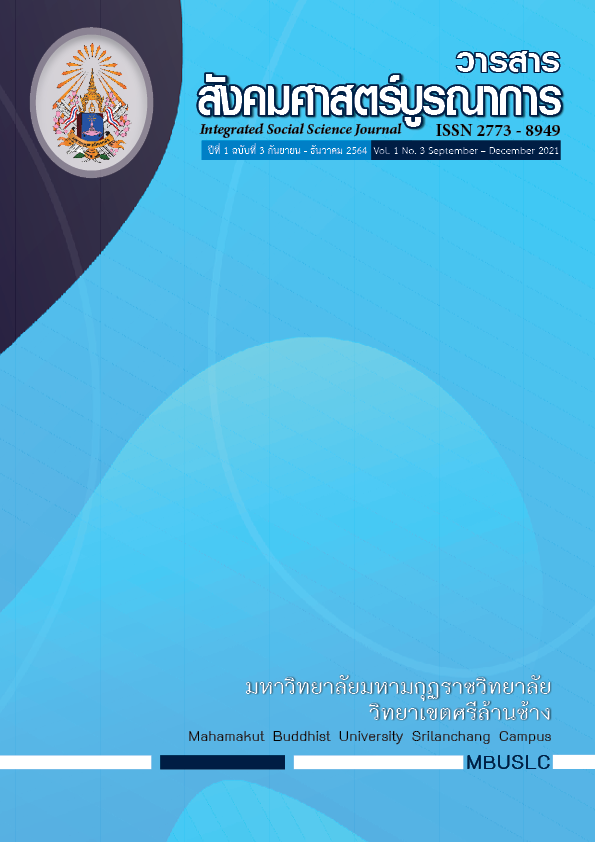PRINCIPLES OF GOOD GOVERNANCE AND PERSONNEL MANAGEMENT IN SCHOOL
Main Article Content
Abstract
The research article aimed to study the application of good governance in educational administrations. The study also pointed to promote guidelines for personnel management in schools. The decentralization of educational administration and management offered management capability directly to the educational institutes, whereas these primary institutions could be more flexible and independent. The study showed that by doing so, (decentralization) it created more potential and more efficient governance by these institutions in all departments. One area of benefit was the personnel management. In order to increase the effectiveness of educational management, school administrators, teachers, parents, and basic community institutional committees had to become more involved in human resource management to achieve these principles of good governance. The study showed that to guide the principles of good governance in primary schools 6 governing principles were needed to be applied: (1) the rule of law (2) morality (3) accountability (4) participation (5) responsibility (6) cost-effectiveness. Therefore, the administrators might provide an atmosphere of comfort and rewards to encourage high job performance as well as encouraging staff to further develop their knowledge and skills to assure a high quality of education.
Article Details

This work is licensed under a Creative Commons Attribution-NonCommercial-NoDerivatives 4.0 International License.
บทความที่ได้รับการพิจารณาจากคณะกรรมการผู้ทรงคุณวุฒิและเผยแผ่ในวารสารฉบับนี้ เป็นทัศนคติและข้อคิดเห็นส่วนบุคคลของผู้เขียนแต่ละท่าน ไม่ถือว่าเป็นทัศนะคติและความรับผิดชอบ
ของบรรณาธิการ
บทความ ข้อมูล เนื้อหา รูปภาพ ฯลฯ ที่ได้รับการตีพิมพ์ในวารสารสังคมศาสตร์บูรณาการ ถือเป็นลิขสิทธิ์ของวารสารสังคมศาสตร์บูรณาการ หากบุคคลหรือหน่วยงานใดต้องการนำทั้งหมดหรือส่วนหนึ่งส่วนใดไปเผยแพร่ต่อหรือเพื่อกระทำการใด ๆ จะต้องได้รับอนุญาตเป็นลายลักอักษรจากวารสารสังคมศาสตร์บูรณาการ ก่อนเท่านั้น
References
กระทรวงศึกษาธิการ. (2550). ออนไลน์. สืบค้นเมื่อ 7 มีนาคม 2564. แหล่งสืบค้นhttp://www.thaischool.in.th/_files_school/84101969/data/84101969_1_20190814-221419.pdf.
จีรวัฏฐ์ บุญวัฒนาภรณ์. (2556). ผลสัมฤทธิ์การบริหารจัดการของกองบังคับการปราบปรามกองบัญชาการตำรวจสอบสวนกลางสำนักงานตำรวจแห่งชาติ. วิทยานิพนธ์ปรัชญาดุษฎีบัณฑิตสาขาวิชารัฐประศาสนศาสตร์, มหาวิทยาลัยศรีปทุม.
ชลลดา พึงรำพรรณ. (2554). ธรรมาภิบาลกับการบริหารทรัพยากรมนุษย์. ออนไลน์. สืบค้นเมื่อ 7 มีนาคม 2564. แหล่งสืบค้น https://www.gotoknow.org/posts/363128
บวรศักดิ์ อุวรรณโณ. (2545). ธรรมาภิบาลในโรงเรียนค์อิสระ. นนทบรี: สถาบันพระปกเกล้า.
สำนักงานคณะกรรมการการศึกษาขั้นพื้นฐาน. . (2551). แนวทางการจัดการเรียนรู้ตามหลักสูตรแกนกลางการศึกษาขั้นพื้นฐานพุทธศักราช 2551. กรุงเทพมหานคร: โรงพิมพ์ชุมนุมสหกรณ์การเกษตรแห่งประเทศไทยจำกัด.
สำนักงานคณะกรรมการการศึกษาแห่งชาติ,. (2542). พระราชบัญญัติการศึกษาแห่งชาติ พ.ศ.2542 แก้ไขเพิ่มเติม (ฉบับที่2) พ.ศ.2545. กรุงเทพมหานคร: สำนักนายกรัฐมนตรี.
อริย์ธัช แก้วเกาะสะบ้า. (2560). หลักธรรมาภิบาลในรัฐธรรมนูญแห่งราชอาณาจักรไทย พุทธศักราช 2560.

